- Home
- Glynnis Campbell
Lady Danger (The Warrior Maids of Rivenloch, Book 1) Page 24
Lady Danger (The Warrior Maids of Rivenloch, Book 1) Read online
Page 24
He lunged past her then, and she had to run to keep up with him as he charged down the steps.
“Do you have more bows?” he asked her as he hurried across the great hall.
“Crossbows.”
“We’ll need everything you have. What about sulphur for Greek fire?”
She frowned. She’d never heard of Greek fire.
“No sulphur,” he murmured. “Rags we can soak in oil?”
“Aye.”
“‘Twill have to do. And fetch candles, lots of candles.”
As much as she wanted to ask him what the bloody hell he was up to, she sensed his urgency, and she trusted his judgment. As she left to find rags and candles, she heard him command the knights to the western battlements, bidding every free man to arm himself with a crossbow and bolts. And again and again, among the men of Cameliard, she heard dire whispers of “trebuchet.”
Pagan cast an uneasy glance at the sky as he paced behind the archers. Storm clouds bruised the heavens now. It was only a matter of time before they loosed their store of tears. He fingered the pommel of his sword, as restless as the gathering storm, as he watched the enemy make camp.
There was nothing more thrilling to Pagan than battling a foe with sword in hand. Aye, he recognized the merits of other weapons—the axe, the dagger, the quarterstaff, the crossbow. But they lacked the spirit of a fine length of Toledo steel in the hands of a trained knight.
To a warrior like Pagan, the trebuchet was an abomination, a machine of war that relied upon brute force rather than finesse. It was a machine for cowards and barbarians too dim-witted to employ strategy. Using such devices was loathsome and unchivalrous.
And so when Pagan laid eyes on the monstrosity rolling over the hill, a quiet rage began to simmer within him. For the English to resort to using such a weapon, a beast of destruction that devoured everything in its path, leaving behind only shattered wood and broken rock, meant that they intended no siege, no negotiations, no compromise, and likely no prisoners. Indeed, they probably meant to make quick work of the keep, to claim it before the sun set and before help could be summoned.
But what exasperated Pagan the most, what made guilt ride deep upon his shoulders, was the fact that because he’d been so eager to start construction on his inner wall, the sward surrounding Rivenloch was littered with great chunks of quarried rock—perfect, deadly missiles for the springing arm of the trebuchet.
The Scots had apparently never seen such a machine. With any luck, Pagan thought, tightening his grip on his useless sword, they’d never see it in action. But he had to get rags and oil to the archers quickly so they could fire a barrage of flaming arrows at the thing. It was the only way to cripple it.
Deirdre emerged upon the battlements, her arms full of candles, a half dozen lads following with rags and oil. He thanked God she wasn’t one of those whimpering wenches who might distract him from the task at hand, but a true helpmate. Her face was etched with concern, but the dark fire in her eyes told him she was as fearless and determined as any of his knights. Pride swelled his chest as he gazed upon her, pride and awe and...aye...love. He loved his stubborn Scots wife.
He wished there was time to tell her how much. When this was over, he silently vowed, he’d weary her ears with pledges of his love. But for now, they had a castle to defend, their castle.
“When I give the order, make your arrows count!” he called out to the knights and archers. “Aim for the trebuchet and those who control it.”
Deirdre studied the wooden tower, trying to puzzle out its workings. “‘Tis like a catapult.”
“Aye, only far more powerful,” he said. “A trebuchet can breach a castle wall with a single...”
Deirdre paled. Pagan could have kicked himself for his careless words. Deirdre might be a capable steward and a valiant warrior, but she’d never had to face such absolute menace to her stronghold. Indeed, the worst threat imposed upon her up till now had likely been the King’s appointment of a Norman as her husband.
He gripped her by the shoulders and gazed forcefully into her eyes. “Listen, Deirdre.” Then he made her an oath, one he prayed to God he could keep. “I won't let Rivenloch fall.”
For a moment, doubt lingered stubbornly in her eyes. But he persisted, willing her to believe in him. Finally she nodded.
“You’d better not,” she warned him, her gaze harsh, reminding him that beneath her soft flesh lay bones of rigid steel. Then her eyes glittered mysteriously. “I would leave our babe more than a pile of rubble.”
He blinked. While they stared at one another, her words sank in, and he frowned in confusion. What did she mean, “our babe”? Was she... Nay, it couldn’t be. It was too soon to tell, wasn’t it?
Nonetheless, the possibility sent a thrill of secret wonder surging through his veins, leaving a strange turmoil in his heart.
He would have questioned her further, but already she was leaving his embrace to make herself useful, distributing candles to the archers.
He, too, had other matters to attend to if he was going to keep his promise. “Soak the rags well in oil and affix them to the points,” he instructed the knights. “Ignite them with the candles, and make sure they’re burning well before you fire.”
Helena poked her head above the stairwell. “I’ve stationed sentries around the perimeter,” she told him, “in the event they try to undermine the wall elsewhere.”
He nodded his approval. Deirdre’s sister might be impulsive, but she was admirably efficient and capable. As dire as their situation was, as unprepared as the people of Rivenloch were for war, as outnumbered as the knights were, Pagan began to believe they might have a chance against the English, if they could cripple the trebuchet.
Then the first raindrop fell on his cheek.
“Shite,” he said under his breath.
Any other day rain would be welcome, for bad weather was the bane of besiegers. But today, it would be England’s ally, dousing the fire of Rivenloch’s arrows.
Deirdre and Sir Rauve came to his side, glowering up at the rain.
“Shite," Deirdre muttered. "We have to fire now."
Rauve shook his head. “The thing is out of range.”
Pagan rubbed his jaw, weighing the circumstances as the rain began to pelt the sod like the hooves of a charger. “We can't afford to wait. If we don’t disable it soon...”
She squinted toward a break in the clouds near the horizon. “How long will it take them to set up the device?”
Rauve followed her gaze. “Not long enough.”
“Ballocks.”
“Let’s see what the archers can do,” Pagan decided.
Rauve turned out to be right. The trebuchet was out of bow range, even for Cameliard's best archers. The fiery shafts shot across the silver sky, only to plunge into the damp sod, several yards in front of the front line, then sputter out.
The enemy seemed impervious to the rain. They continued their work, edging the trebuchet forward, protecting it with an array of shields that formed what looked like an enormous breastplate of scale armor. Though they drew in range of the archers, no shaft could penetrate the steel mantle. Even those arrows that happened to lodge fortuitously in the upper beams of the trebuchet were soon doused beneath the raging downpour.
Glaring up at the cruel sky, Pagan began to wonder if God might be English.
Deep within a storeroom of the keep, Miriel hushed the children and their mothers, ever vigilant for the sound of a battering ram. As long as the outer walls were secure, she knew, they would be safe. And if Sung Li had successfully slipped out the front gates, help would arrive within a day.
Meanwhile, she would do as Sung Li had advised and listen for sounds of invasion, for if the siege turned into a full-scale attack, if Rivenloch’s security was breached, she might be forced to disclose one of the castle’s most closely guarded secrets.
Failing that, Miriel had one other option. She eyed the small cache of weapons she’d stowed in the corner
of the storeroom—her sais, tonfas, kamas, and nunchakus. If the need arose for close combat, she wouldn’t hesitate to use them. She’d have a lot of explaining to do later, but at least she’d be alive to do it.
High atop the curtain wall in full armor now, Helena loped past the archers she’d stationed at vantage points along the eastern perimeter. So far, she thought, the English were focused on only the west side of the castle, but that could change at any time. It was essential that the archers watch for small bands of sappers.
She smiled in grim satisfaction as she gazed down the long row of attentive sentries. At least these men didn’t gainsay her every command, unlike the bullheaded Norman she’d held captive for the last several days.
She bit her lip, wondering what had become of Colin. She hoped, after all the pains she’d gone to caring for him, defending him, helping him limp back to Rivenloch, that he wouldn’t do something foolish and get himself killed.
He had a lot of audacity, thinking he could order her into the keep along with the other helpless females. Hadn’t he discovered anything from their escapades? Didn’t he realize she wasn’t an ordinary wench, but a Maid of Rivenloch? Couldn’t he accept that she was just as worthy a warrior as his own fellows?
Colin du Lac had much to learn about Helena of Rivenloch. That much was certain. She only hoped he’d live long enough to be taught.
Colin winced as pain shot through his thigh. Sweat dampened his brow as he ascended the steps of the western tower of the outer wall, leaning heavily against the rough stone. He still hadn’t found Helena’s father, but at the slug’s pace he was forced to, the old man likely outdistanced him at every turn. Colin was clearly not the man for this task, not with his half-healed leg. But at the moment he was glad of the distraction, for all he could think about was Helena and her stubborn insistence on participating in the battle.
God, she was a wayward wench. Once she put her mind to something, it seemed neither common sense nor wild chargers could sway her from her course. It had been so with abducting him. No matter how he reasoned with her, assuring her that her sister wouldn’t suffer at Pagan’s hands, warning her that Pagan’s justice would be harsh if she insisted on ransoming him, persuading her that all would be forgiven if they returned safely, she wouldn’t listen.
Of course, her tenacity had also saved his life. She’d been uncommonly brave in the face of grave peril. Indeed, he might have bled to death were it not for her determination to keep her hostage alive.
But this...this was different. There was an entire army out there, and no matter how invincible she believed she was, her flesh was still mortal. Mortal and vulnerable and...and as smooth as fine silk.
He furrowed his brow, cursing the lusty thoughts that drifted through his mind too frequently of late. After all, he didn’t love the wench. She was amusing, aye, and attractive. Desirable. And fascinating. But she was trouble. Besides, if she continued living so dangerously, with no care for her own safety, she’d not last out the siege.
He staggered against the wall as another pain streaked through him. This one, however, pierced not his leg, but his heart.
Directly above Colin, at the top of the outermost tower of the castle wall, the Lord of Rivenloch listened to his beloved Edwina. She was calling him, calling for help. A sob clotted in his throat, and tears rolled down his cheeks, for no matter where he wandered, he couldn’t seem to find her.
“Edwina, my love,” he called, his voice grating with despair.
She wept softly, and he tried to discern the source of the sound. But it seemed to envelop him, coming from everywhere and nowhere, and he spun slowly around and around, gazing upon nothing but empty gray stone.
He felt helpless, so helpless. He pulled at his hair in frustration, straining to hear, but now it seemed only the rain murmuring upon the stone sill.
He plodded to the window and peered through the arrow slit. Upon the knoll before the castle, an army had gathered. They were not Rivenloch’s soldiers, nor were they the knights belonging to the Norman. He wondered from whence these new men had come. He gazed at the strange company with a sense of detachment, as if he watched preparations for a Christmas play. They had some wooden thing, he saw, that looked like a giant child’s toy. He absently scratched his head as they blocked the wheels into place and fussed with the various ropes and protrusions. Then several men hefted a great chunk of rock onto the platform at the back.
As if from Thor’s hand, a hail of fiery arrows suddenly descended from the heavens to kill the great wooden beast. But the flames instantly sputtered out, drowned by the downpour.
Then, like a loosed crossbow, the toy sprang with such violence and speed that he barely glimpsed the missile catapulting toward him. The rock hit the tower, impacting with a deep thud, then an ominous crack, shuddering the stones beneath him and dropping him to his knees.
Like a bone-jarring roll of thunder, the rock around him rumbled and quaked loose with an unholy roar. Before his eyes, the western half of the tower crumbled away, and he could do no more than huddle on his hands and knees, cling to the oak planking of the floor, and watch the walls disintegrate. Wet wind suddenly whipped his hair and stung his face, and he squinted against the abrupt brilliance of the open sky.
He must have displeased the gods, he decided as the rain pelted him like angry tears. The devastation around him was clearly the work of Thor’s hammer.
Deirdre’s hand tightened on the wet stone of the parapet as she watched the far west tower collapse, along with the section of the wall walk connecting it. Her heart stopped, and she could suck no air into her lungs. She’d beheld the arm of the trebuchet as it flung its burden with incredible force, but she’d never imagined the powerful blow it would deal—the earthshaking impact of the rock and the deep, gaping wound it would leave.
All around her, the Rivenloch men stood in mute awe, clutching their bows with white knuckles, though such weapons now seemed as useless as a feather against a sword.
For the first time in her life, fear and doubt made sweat trickle at the back of her neck. These were no mere mortals with blades they battled, but a monster fashioned upon Lucifer’s forge. How could they hope to triumph against such a machine?
Despair lurked over her shoulder like a carrion crow, eager for the spoils of war, threatening to consume her before she was even defeated.
Then she glanced over at Pagan, who gazed out at the enemy with a fierce glare and a clenched jaw. He was not vanquished. Far from it. Pagan of Cameliard would not surrender. He would never surrender. Even if that damned trebuchet flung a rock straight at his belly, he’d die facing the English with a raised fist and a defiant sneer.
How could she be any less brave?
Inspired by him, Deirdre of Rivenloch straightened her spine and steeled her nerves, loosening her grip on the wall and clenching a fist instead around the pommel of her new sword. “Hold your fire!” she shouted to the archers, surprised at the steadiness of her voice.
The walls were still crumbling, sending up white plumes of dust and rubble, as the English prepared to strike again. The soldiers held their ground. They didn't need to advance on foot, not when they wielded such a formidable weapon. She studied their position, the trajectory of the trebuchet.
“Will they aim for the same tower?” she asked over the drumming of the rain.
Rauve nodded. “Aye, to make a point of entry.”
“Good. A single point is easy to defend. We’ll move the men-at-arms there.”
“‘Twill be easy” Pagan agreed gravely, “unless they move the trebuchet.”
She lowered grim brows. “Then let’s kill them while we can.”
CHAPTER 26
Pagan frowned. He didn’t intend to allow Deirdre into the thick of battle, no matter how much she insisted, no matter how much he respected her skills, no matter how much she begged him. It would be too distracting to him to worry about her safety while he engaged the enemy.
Besides, if it was tr
ue that she was with child...
He wouldn’t meet her eyes. “I need you to command the archers from here.”
“But the archers are useless.”
“The rain may let up.”
“Then they will know enough to fire.”
He sighed. “I want you up here, Deirdre.”
She was silent long enough for him to realize she knew the truth, that he didn’t intend to let her fight. “Oh, aye,” she said bitterly, “while you’re down there risking your neck, I’ll be dancing upon the parapet, waiting for the sun to appear.” She spat on the stones. “This is my castle, and I’ll be damned if I’ll let a Norman—“
”Faith!” one of the archers cried. “‘Tis the lord!”
Pagan followed the man’s gaze along the west wall to the distant tower. Through the white haze of rising dust, he saw a figure crawling across the splintered floor at the top of the ruin. It was Lord Gellir. “Bloody hell.”
Beside him, Deirdre drew in a ragged gasp.
“Bloody hell,” he repeated.
As he watched in dread, the lord crept closer and closer to the ledge, where the rock yet trickled away. What possessed the man to pursue his own ruin, Pagan couldn’t fathom. Maybe his dead wife beckoned him to join her. Whatever drove him, Pagan knew he’d never reach the lord in time. The wall walk between them was damaged. The only passage to the tower was through the courtyard. But one glimpse of Deirdre frozen in horror at his side, her face a mask of helpless torment, and Pagan knew he had to try.
“Look!” Rauve shouted.
Another figure emerged upon the tower floor. At this distance, covered in dust, bowed in fatigue, limping across the planks, he was barely recognizable. But Pagan knew his man like he knew his own scars. “Colin.”

 Bride of Fire
Bride of Fire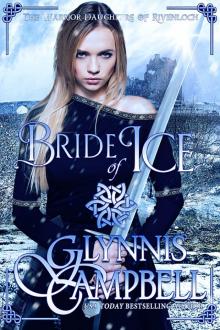 Bride of Ice
Bride of Ice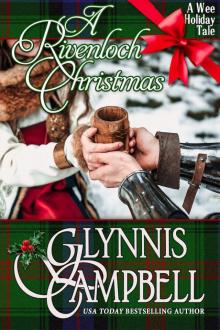 A Rivenloch Christmas
A Rivenloch Christmas The Storming
The Storming Native Hawk (California Legends Book 3)
Native Hawk (California Legends Book 3)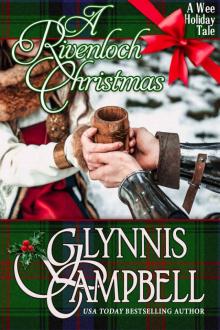 A Rivenloch Christmas: A Wee Holiday Tale (The Warrior Daughters of Rivenloch Book 0)
A Rivenloch Christmas: A Wee Holiday Tale (The Warrior Daughters of Rivenloch Book 0)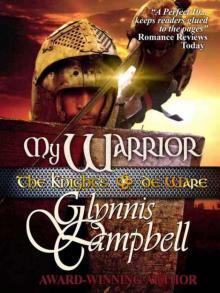 Knights of de Ware 02 - My Warrior
Knights of de Ware 02 - My Warrior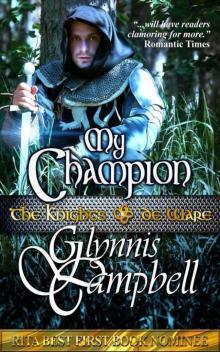 Knights of de Ware 01 - My Champion
Knights of de Ware 01 - My Champion The Shipwreck
The Shipwreck MacAdam's Lass
MacAdam's Lass Native Wolf
Native Wolf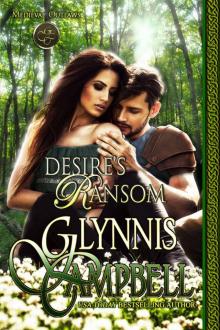 Desire's Ransom
Desire's Ransom Native Gold
Native Gold The Reiver
The Reiver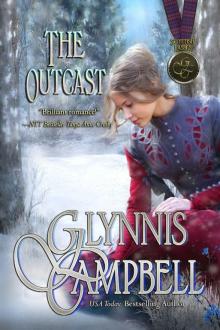 The Outcast
The Outcast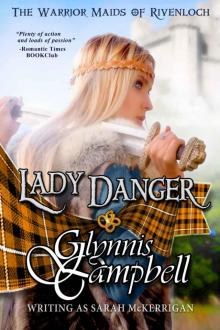 Lady Danger (The Warrior Maids of Rivenloch, Book 1)
Lady Danger (The Warrior Maids of Rivenloch, Book 1)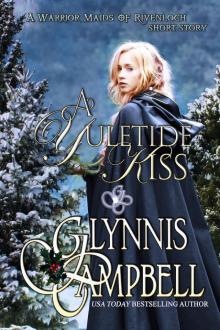 A Yuletide Kiss
A Yuletide Kiss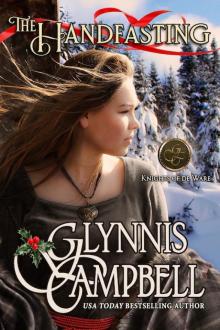 The Handfasting
The Handfasting Maids with Blades
Maids with Blades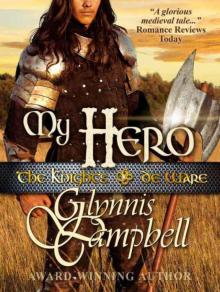 Knights of de Ware 03 - My Hero
Knights of de Ware 03 - My Hero Passion's Exile
Passion's Exile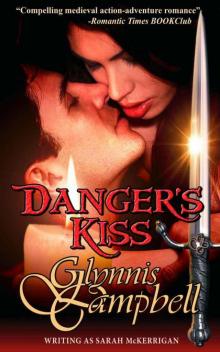 Danger's Kiss
Danger's Kiss Highlanders for the Holidays: 4 Hot Scots
Highlanders for the Holidays: 4 Hot Scots